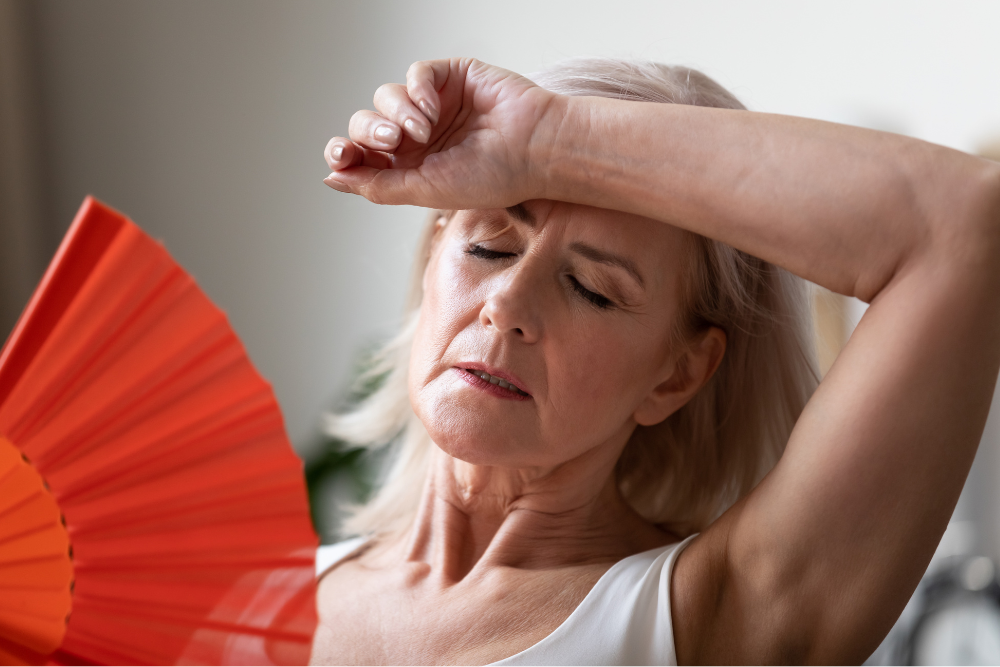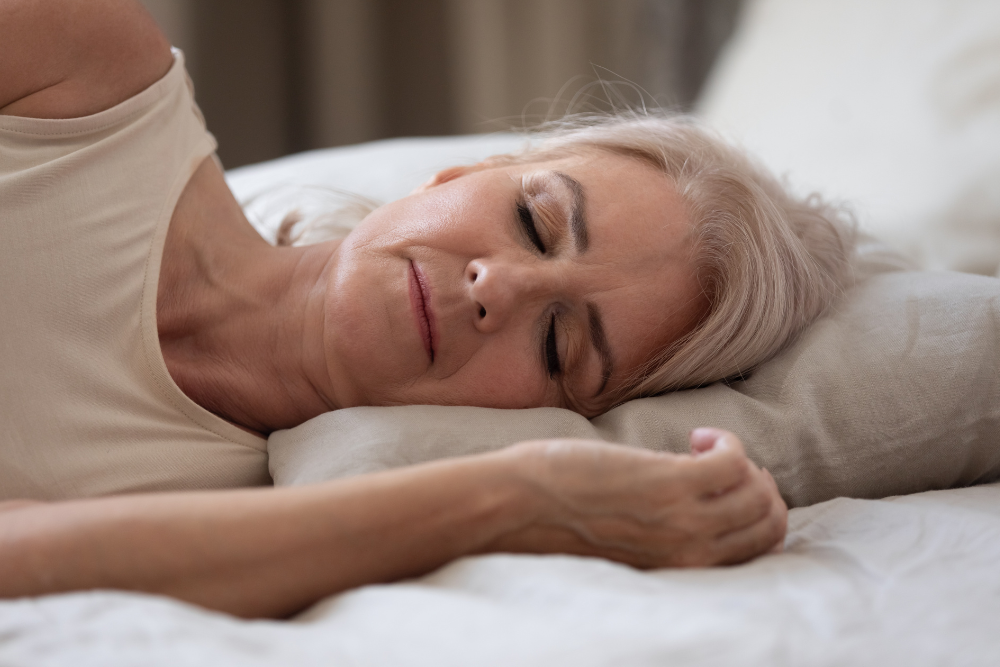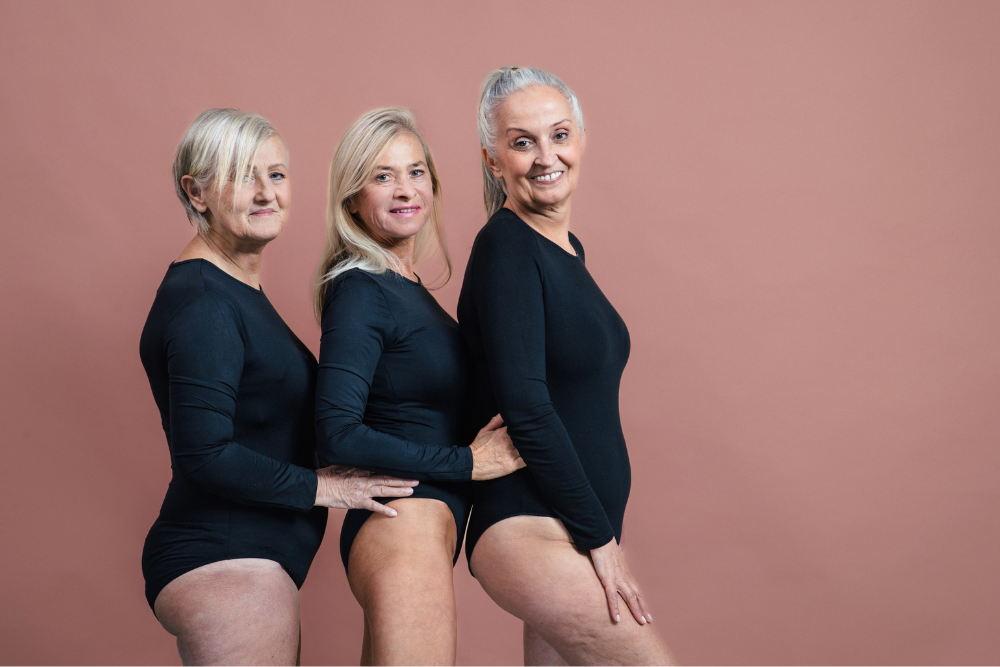Menopause is a significant chapter in a woman’s life, signalling the end of her reproductive years. It’s a natural process with diverse experiences, both physically and emotionally. In this guide, we break down what menopause is, the science behind it, and the wide range of symptoms that may accompany it. Beyond the biological details, we’ll explore how menopause can impact overall well-being and offer practical insights to help women navigate this transformative phase.
Recognising the Symptoms of Menopause
As women traverse the transformative journey of natural menopause, their bodies undergo a series of changes that manifest in various symptoms. Recognising these signs is paramount for understanding and navigating this natural transition. Here, we explore the common menopause symptoms to empower you with knowledge and awareness.
Physical Symptoms
Menopause symptoms typically start before your periods cease completely. Physical changes can include irregular periods, hot flashes, and night sweats. Sleep disturbances, like insomnia, are common. Fatigue and weight gain due to a slower metabolism are also frequently reported. Additionally, menopause may bring about sore breasts, skin changes such as dryness or itchiness, headaches, body aches, and bloating. Women may also encounter bladder, vaginal, and vulval problems, including dryness, reduced libido, and urinary issues.¹
Mood and Emotional Health
Menopause can impact emotional well-being and mood stability. Many women find it harder to cope with daily stresses, experience difficulty concentrating, and may notice increased forgetfulness. Irritability, frustration, anxiety, and mood swings are common emotional symptoms during this transition. These effects can vary in intensity, potentially exacerbated if menopause is induced by surgery or cancer treatment.¹
Recognising the signs of menopause is the first step toward navigating this transformative phase with confidence. By understanding these symptoms and their potential impacts, women can take proactive measures to manage their health and well-being during this natural transition. Embracing the changes that come with menopause is a powerful journey towards self-awareness and empowerment.

Coping with Hot Flashes
Coping with hot flashes, which are sudden feelings of intense warmth, flushing, and sweating, is a common concern during menopause. While the exact cause of hot flashes is not fully understood, hormonal changes, particularly a decrease in oestrogen, are believed to play a significant role. Here are some effective tips and tricks to help cope with hot flashes:
Dress in Layers
-
Wear lightweight, breathable fabrics that can be easily adjusted to regulate body temperature.
-
Dress in layers so you can remove clothing when a hot flash occurs.
Stay Cool
-
Use fans, air conditioning, or open windows to maintain a cool environment.
-
Keep a small, portable fan with you for on-the-go relief.
Stay Hydrated
-
Drink plenty of water throughout the day to stay hydrated.
-
Cold water or ice chips can provide quick relief during a hot flash.
Manage Stress
-
Find effective ways to manage stress.
-
Practice stress-reduction techniques such as deep breathing, meditation, or yoga.
-
Regular exercise can also help reduce stress and improve overall well-being.
Avoid Triggers
-
Identify and avoid triggers that may contribute to hot flashes, such as spicy foods, caffeine, alcohol, and smoking.
-
This may involve finding treatments to quit smoking.
Cooling Products
-
To alleviate discomfort, use cooling products, such as cooling towels, gel packs, or cooling pillows.
Maintain a Healthy Lifestyle
-
Eat a balanced diet rich in fruits, vegetables, and whole grains.
-
Get regular exercise, but avoid intense workouts close to bedtime.
Medication and Supplements
-
Consult a healthcare professional about hormone replacement therapy (HRT) or other medications that may help manage hot flashes.
-
Some individuals find relief through natural supplements like evening primrose oil, but discussing these with a healthcare provider is important.
Sleep Environment
-
Brush up on the importance of good sleep hygiene.
-
Keep your bedroom cool and comfortable for better sleep.
-
Use moisture-wicking bedding and sleepwear to minimise discomfort during the night.
Remember, what works for one person may not work for another, so it may take some trial and error to find the most effective strategies for you. If hot flashes are significantly impacting your quality of life, consult a healthcare professional for personalised advice and potential menopause treatment options.

Menopause and Mood Swings: Navigating Emotional Rollercoasters
Alongside physical changes, menopause often brings about hormonal fluctuations that can lead to mood swings, irritability, and emotional ups and downs.¹ The decline in oestrogen levels during this transition can impact neurotransmitters like serotonin, affecting mood regulation.
Navigating emotional rollercoasters during menopause requires a multifaceted approach. Regular exercise, a balanced diet, and sufficient sleep contribute to overall well-being and may help stabilise mood. Engaging in stress-reducing activities such as meditation or yoga can also be beneficial. Additionally, seeking support from friends, family, or mental health professionals can provide valuable coping strategies and emotional reassurance during this challenging period of life.
Managing Menopause Weight Gain
Managing weight gain during menopause can be challenging, but adopting practical strategies can help minimise its impact. It’s important to note that weight gain during menopause is influenced by hormonal changes, lifestyle factors, and ageing. Here are some practical strategies to help manage menopause-related weight gain:
Balanced Diet
Focus on a well-balanced diet that includes a variety of fruits, vegetables, whole grains, lean proteins, and healthy fats.
Consider consulting a nutritionist or dietitian for personalised guidance.
Regular Exercise
Engage in regular movement that you enjoy to boost your metabolism and maintain a healthy weight.
Incorporate aerobic exercises (such as walking, jogging, or swimming) and strength training into your routine to improve muscle tone and metabolism.
Aim for at least 150 minutes of moderate-intensity aerobic activity or 75 minutes of vigorous-intensity activity per week.
Strength Training
Include strength training exercises to build muscle mass, which can help increase metabolism and counteract age-related muscle loss.
Consider activities like weight lifting, resistance training, or yoga.
Hydration
Drink plenty of water throughout the day to stay hydrated.
Sometimes, the body may confuse thirst with hunger, leading to unnecessary calorie consumption.
Mindful Eating
Practise mindful eating by paying attention to hunger and fullness cues.
Avoid distractions like watching TV or using electronic devices while eating to prevent overeating.
Limit Processed Foods
Reduce your intake of processed and sugary foods, which can contribute to weight gain and disrupt hormonal balance.
Opt for whole, nutrient-dense foods to support overall health.
Adequate Sleep
Prioritise getting enough quality sleep, as inadequate sleep has been linked to weight gain.
Aim for 7-9 hours of sleep per night.
Consider sleep treatments like melatonin if you have consistent trouble getting a good night’s rest.
Remember that individual responses to these strategies may vary, and it’s essential to consult your healthcare provider before making significant changes to your diet, exercise, or considering hormone replacement therapy. They can provide personalised advice based on your health history and individual needs.

Bone Health During Menopause: Maintaining Strong Bones
During menopause, hormonal changes, specifically a decline in oestrogen levels, can significantly impact bone health, increasing the risk of osteoporosis and fractures. Maintaining strong bones during this phase is crucial for overall well-being.
Adequate calcium intake is essential, and it’s recommended that women over 50 aim for 1,300 milligrams of calcium daily through a combination of dietary sources and supplements if necessary.² Vitamin D is also crucial for calcium absorption, so ensure sufficient exposure to sunlight or consider supplements. Regular weight-bearing exercises, such as walking or weight training, help to strengthen bones and improve bone density. Additionally, avoiding excessive alcohol and tobacco use can positively impact bone health.
Consulting with a healthcare professional to assess bone density and discuss preventive measures tailored to individual needs is advisable to promote optimal bone health during menopause.
Sleep Disturbances: Dealing with Menopause-related Insomnia
Menopause can bring about various sleep disturbances, with insomnia being a common concern. Fluctuating hormone levels, hot flashes, and night sweats can contribute to difficulties falling asleep and staying asleep during this phase.
To address menopause-related insomnia, adopting good sleep hygiene practices is crucial. Establish a consistent sleep schedule, aiming for the recommended 7-9 hours of sleep per night. Create a relaxing bedtime routine, incorporating activities such as reading or gentle stretching to signal the body that it’s time to wind down. Keep the bedroom cool, dark, and comfortable, and invest in moisture-wicking bedding to alleviate discomfort from night sweats. Managing stress through meditation or deep breathing can also improve sleep quality.
If symptoms persist, consult a healthcare professional to explore potential interventions, such as hormone replacement therapy or other sleep aids, while considering the individual’s overall health and preferences.
Menopause and Sexual Health: Understanding Changes and Solutions
Menopause is a natural biological process that marks the end of a woman’s reproductive years. It typically occurs in the late 40s or early 50s (the average age of menopause is around 51 years)¹, and one of the significant changes associated with menopause is a decline in the production of hormones like oestrogen and progesterone. These hormonal changes can have a significant impact on various aspects of a woman’s health, including sexual health.
Changes in Sexual Health During Menopause:
Vaginal Dryness: Declining oestrogen levels can lead to a reduction in vaginal moisture, causing dryness and discomfort during sexual activity.
Loss of Libido: Some women may experience a decrease in sexual desire or libido during menopause, which can be influenced by hormonal changes, physical discomfort, and emotional factors.
Painful Intercourse: Vaginal dryness and changes in the elasticity of vaginal tissues can result in pain or discomfort during sexual intercourse.
Mood Changes: Menopausal symptoms such as mood swings, irritability, and anxiety can impact a woman’s overall well-being, including her sexual health.
Solutions and Strategies
Hormone Replacement Therapy (HRT): HRT involves replacing hormones (such as oestrogen and progesterone) to alleviate menopausal symptoms. However, discussing the potential risks and benefits with a healthcare provider is essential, as HRT may not be suitable for everyone.
Vaginal Moisturisers and Lubricants: Over-the-counter vaginal moisturisers and lubricants can help alleviate vaginal dryness and enhance comfort during sexual activity.
Pelvic Floor Exercises: Kegel exercises can help strengthen pelvic floor muscles, improving vaginal tone and potentially reducing discomfort during intercourse.
Communication with Partner: Open communication with a partner about changes in sexual desire, preferences, and concerns is crucial. Understanding and support from a partner can positively impact a woman’s experience during this transition.
Psychological Support: Menopause can bring about emotional challenges. Seeking support from friends, family, or a mental health professional can be beneficial in navigating these changes.
Healthy Lifestyle Choices: Maintaining a healthy lifestyle, including regular exercise, a balanced diet, and adequate sleep, can contribute to overall well-being, including sexual health.
It’s important for women experiencing changes in sexual health during menopause to consult a healthcare professional to determine the most appropriate and personalised solutions for their individual needs. Every woman’s experience with menopause is unique, and tailored approaches are often the most effective.

Lifestyle Adjustments: Thriving during the Menopausal Transition
The menopausal transition is a natural phase in a woman’s life, and making lifestyle adjustments can significantly contribute to thriving during this period. Here are several lifestyle strategies to enhance well-being and navigate the challenges associated with menopause:
-
Social Support: Maintain strong social connections. Share your experiences with friends, family, or support groups to foster understanding and emotional support.
-
Mind-Body Practices: Explore mind-body practices such as tai chi or mindfulness meditation. These practices can promote relaxation, reduce anxiety, and improve overall mental well-being.
-
Regular Health Check-ups: Schedule regular check-ups with healthcare providers to monitor overall health and address any specific concerns related to menopause.
-
Clothing: Dress in layers to manage temperature fluctuations associated with hot flashes. Choose breathable fabrics to stay comfortable.
-
Environment: Maintain a comfortable indoor environment by using fans, adjusting room temperature, and using cooling techniques as needed.
-
Educate Yourself: Stay informed about the menopausal transition and its potential effects on physical and mental health.
-
Hub.Health – Your Online Menopause Solution: Access menopause treatments, expert advice, and support from the comfort of your home. Thrive during menopause with convenient online services, delivering care to your door.
By incorporating these lifestyle adjustments, women can not only manage the challenges associated with menopause but also promote overall well-being and thrive during this natural phase of life. It’s important to approach this period with a positive mindset and a proactive approach to self-care.
Start your consultation now!
Sources
- Healthdirect. Menopause. Available from: https://www.healthdirect.gov.au/menopause. Accessed June 14, 2024.
- National Health and Medical Research Council. Calcium. Available from: https://www.eatforhealth.gov.au/nutrient-reference-values/nutrients/calcium. Accessed June 14, 2024.





